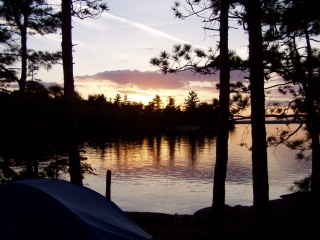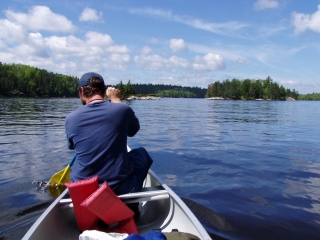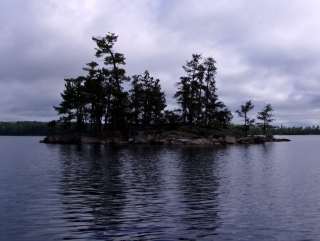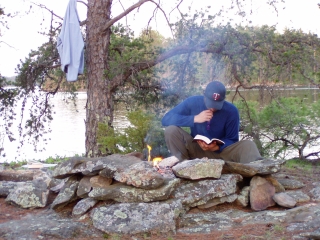NPS Website; Local Website
 WHAT IS IT?
WHAT IS IT?A boreal forest ecosystem carved by Ice Age glacial action consisting of dozens of lakes and hundreds if not thousands of islands. Voyageurs NP is a water-based park. 84,000 acres of water, in fact. Hiking trails exist, but their entry points must be reached by boat.
BEAUTY (7/10)
The waters glisten, the islands charm and the skies shine a stunning blue. Numerous Bald Eagles soar above while one of the continent’s largest varieties of warblers sing in the background. You comment to yourself, “this place is so beautiful”. Then another motor boat loudly speeds by and rocks your canoe.
HISTORICAL INTEREST (3/10)
More so in the Park’s name. These lakes were just a traveling route for the Voyageurs, like a present-day interstate. Park videos will explain the Voyageurs to some extent, but if you are interested in the history of the French-Canadian über-trappers, go to the site of their annual rendezvous: Grand Portage National Monument, Minnesota.
CROWDS (1/10)
The National Park Service sites are for everyone, snowmobilers, motorists and boatsmen alike. Still, the ubiquitous presence of outboard-motored fishing boats brought our humble canoeing selves to a breaking point many a time. We wanted to experience the pathways of the voyageur, voyageur-style: in a canoe. Wrong choice on a weekend. We fought constant wakes from inconsiderate anglers. Finding a campsite was impossible given our distinct speed disadvantage, the crowded nature of the Park and the relative lack of park designated tent sites.
After entering the Park’s waterways, we slowly paddled from filled campsite to the next while our high-speed, first-come, first-served competition easily claimed the empty sites; preparing their ornate tents while we cursed our canoe, each other and motor boats in general. We eventually found a darling island, about 60 feet in diameter (not an actual campsite) where we were able to pitch the tent. Little did we know that we were in earshot of two official sites where the swearing, cribbage games (presumably), and outboard motors blocked out all natural sounds until long after 11:00pm.
Lest we sound too grumpy, we did have a great time. Just don’t expect peace and tranquility.
 EASE OF USE/ACCESS (1/5)
EASE OF USE/ACCESS (1/5)Voyageurs NP is a water-based Park. Ranger-led boat tours start in mid-June for a fee. Until then you need to a rent or purchase a water going craft to experience anything.
CONCESSIONS/BOOKSTORE (4/5)
We visited three of the Park’s four Visitor Centers. All three had terrific book selections ranging from Ojibwa legend and fiction, Voyageur books, and a large selection of birding information. We were tempted to buy an adorable stuffed moose but somehow relented. There are plenty of other kid-related items, nice T-shirts and a waterproof map of Voyageurs NP for $8.95; cheaper than the $10 version our canoe outfitter was offering.
COSTS (3/5)
The park itself is free, as is the backcountry camping pass. The boat you need to travel within Voyageurs is not. Plan accordingly. There are only a few outfitters nearby the Park. Most of the lodges offer boat rental but only if your staying with them.
RANGER/GUIDE TO TOURIST RATIO (4/5)
All Visitor Centers were staffed with numerous friendly and helpful Rangers. We suppose there are Rangers out on the water, patrolling the lakes but it’s hard to differentiate between all the boats speeding around you.
 TOURS/CLASSES (6/10)
TOURS/CLASSES (6/10)There are three Visitors Centers at strategic shoreline points – each had unique exhibits and displays, as well as their own bookstores. At the Ash River Visitors Center, we had our choice of movies – one on the voyageurs, one on the formation of the waterways and one showcasing the park and its flora and fauna. We watched one on the park itself while we waited for our outfitter to come pick up the rented canoe.
The Rainy Lake Visitors Center was host to a Birders’ Rendezvous the weekend we were there. Kabetogama Lake Visitors Center was where we found out about the closest canoe outfitter and gaped in amazement at the photos of two bald eagles fighting in the Lake. The photos were taken by a Ranger getting ready to lead a boat tour.
Ranger-led boat tours do not begin until the middle of June so we had no opportunity to partake. There are additional fees for most tours.
FUN (6/10)
The first three to four hours of the first day were no fun at all. Once we got the hang of paddling the canoe together, overcame our fear of being tipped by the wake of a speeding motorboat and finally found a flat, semi-private place to camp, we had a blast.
We should have known better than to set off on one of the first hot weekends in June. The stress of finding a place to sleep was overwhelming – once we spotted our island, the worry dissipated and we were able to sit back, relax and really look at our surroundings for the first time. This place is beautiful. We sunbathed on our rocky shore. We watched the sun set for what seemed like hours. The next day, we slept in until the rain stopped, then paddled around the neighboring islands exploring and looking for wood for the evening fire.
That evening fire never happened – black skies came rushing toward us almost as quickly as the motorboats scurrying to get back to their campsites before the downpour. We had just enough time to collect our things and jump in the tent, which was being whipped by sudden bursts of wind. We held down the tent as water poured down and whitecaps formed on the lakes. Twenty minutes later, the skies cleared, the waters calmed and we had yet another phenomenal sunset. When we recounted our experience to the canoe outfitter he thought for a minute then said, “that actually sounds like a lot of fun.” It was.
 WOULD WE RECOMMEND? (5/10)
WOULD WE RECOMMEND? (5/10)The Lakes are beautiful, just not peaceful. The Park seems to be unique in that it caters primarily to sportsmen. Perhaps it would be better designated as a National Recreation Area. We cannot attest to the fishing quality but there were anglers everywhere. They all seemed to be having a great time in a stunning natural setting. Who knows how many walleye, northern pike and smallmouth bass they were catching.
We would not recommend Voyageurs for a canoeing vacation. Go to the nearby motor-less Boundary Canoe Waters which are part of the National Forest System (under the Department of Agriculture jurisdiction and sadly, not a destination on our two-year sojourn).
TOTAL 40/80
www.usa-c2c.com
© 2004-06